![]()
He was charming, witty, and took blame upon himself. Adviser Ayub Quadri, was the Minister of Education, Minister of Primary and Mass Education and Minister of Cultural Affairs, Government of the People?s Republic of Bangladesh. He was the perfect guy to rely upon for damage control. The public school background showed, as did the many years as a top bureaucrat. He had been a member of the elite Civil Service of Pakistan (CSP). An old boys network that still holds clout in the subcontinent.
The Press Information Department (PID) auditorium on the 3rd floor of Building 9, in the Bangladesh Secretariat was packed. Unlike many other Bangladeshi events this press conference started on time. Squeezing through the footpaths, crossing fences, lifting my bicycle over rickshaws stuck in traffic, I had panted my way to the secretariat. The police at gate 2 had been too perplexed by a bicycle going through the gate to even stop me for papers. I arrived just as the first question was raised. It was a packed hall, and while I thought I would stay at the back, I realised that I needed to get up there to stand any chance of getting a question in. I sat on the floor in between the video tripods.
The journalists had done their homework. And while there were a few questions that were repetitive, by and large, they knew what they wanted. In response to a question about the alleged corruption charges against one of the government officials involved in the transaction, the adviser joked. “Well I am the person in overall charge. The police don’t seem to be after me for corruption.” Pretty answer. Pity it didn’t answer the question.
The large table with the adviser in the middle was imposing. The Secretary of Culture on the left and another officer on the right played a largely ornamental role. So did the entire row of officials in the back. They did however lean forward to whisper in the adviser’s ear from time to time. The question came up of the alleged transportation of the bronze casket in 1959 to France, which Mr. Zakaria, the ex Secretary of Culture had mentioned in a press conference on the 1st December. The adviser let the question slip, saying he’d heard of such accusations and was looking into it. A member of the back row broke ranks and retorted, “There is no such record.” Mr. Zakaria, also an ex director of the department of archaeology, had mentioned a 49 year fight to get back this prized possession, without success. A journalist mentioned the case of the 30 paintings of Mohammad Younus. They had been sent to Yugoslavia, on a government to government exchange. None had ever come back. Quadri again said he didn’t know. “Don’t know” was quite a common response to questions. Candid perhaps, but not particularly useful.
In answer to the questions about the irregularities regarding the loan inventory, the adviser did provide figures, but no documents he could back them up with. Questions from the floor pointed to the disjoint between the figures he quoted and the ones given in the government documents submitted to the court. That they didn’t correspond to the inventory produced by the French themselves. He promised to provide updated documents this very evening. Tomorrow morning at the latest. Why the government had provided documents to the court which did not tally with the shipment, was a question that never got asked, and was certainly not clarified. The mystery of calling a press conference, but not having these documents at hand was never solved by the guests.
“I have full confidence that the items will come back.” He said, taking the weight of the world on his shoulders. As to why Bangladeshis should have confidence in him, was one that was never clarified.
“The company that had packed the crates have been doing so for 300 years,” he mentioned. The doubters have been asking for the packers to be named ever since the beginning, but have not been given an answer. Those who had thought the press conference would enlighten them were disappointed.
Since only government members of the committee were present, there was no one to question the claim that everything had been done to please the committee. That the committee had been fully satisfied with the proceedings. The fact that the official letter by the committee, in the hands of the press, said something entirely different was a mere technicality.
The inconsistencies were the problem. We still don’t know exactly how many items are being sent. Neither do we know exactly what is being sent. The few specifics the advisor provided, that there were “50 silver coins, and 8 gold coins,” might have helped in purchasing supplies for an Everest expedition, but didn’t help much in evaluating either the value, or the specifics of a museum item. Especially when the court record states “50 punchmarked coins” in one entry and an unspecified number of “gold and silver coins” in another. Assuming the number of silver coins in the latter entry is non-zero, and that the punchmarked coins are all silver, we still have a problem. The French inventory specifies “93 punch marked coins.” Are the “gold and silver coins” non-punchmarked? Do they add up to the “8 gold coins” the adviser was referring to? 50 + non-zero number = 50 and 50 + 8 = 93 in Ayub Quadri’s arithmetic.
There are bigger issues. He generally accepted that the insurance value was low, but claimed that it was an academic issue in the case of priceless items. Especially since he was confident that they were all coming back. However the French press release, issued on the 25th September 2007, stated that the insurance value was 4 million euro. The adviser today clearly stated 2.6 million euro. So who are we to believe? We are after all talking of the most prized possessions of a nation. Consistent statements help remove doubt. The adviser’s “confidence” might work on a poker table, but does little to put a worried population at ease.
He brushed off the accusation about whisking off the items in a hurry, or that there was any question of impropriety or stealth in terms of going against court directives. When asked why such an important event, which was covered by all major independent media, was completely unreported on state television, he smiled. The gentleman on the right did speak up this time. He pointed out that the question was “irrelevant.”
Other questions remain. Gold and silver coins is one thing. In the documents presented to the court by the government, even one of the most valued items, the large (and extremely rare) bronze statue the Vajrasattva does include an insurance value (not always the case for other items listed) of 200,000 euro. This item too does not have an accession number.
Quadri was unruffled throughout, never losing cool. Always extremely pleasant. His only admission to some concern was in answer to a question about when the items would come back. He said in no uncertain terms, “April.” He added, “Until then, I will stay worried, and looking at the mood in the room, I can tell that you too will not rest.” I hope he meant 2007.
As a child, we would watch the candy floss man take a tiny spoonful of sugar, a dollop of colouring and would watch with amazement as the machine spun out a pink web, which he would twirl around a stick. One portion was only dui poisha (two paisa). A figure which we could realistically save up. The large pink fluff, folded on contact, and melted in the mouth, but did give a sense of attainment. We called it hawai mithai, sweet made of air. This candy floss press conference too, had little substance but plenty of form.
Whether the media kids will feel they got value for their dui poisha is something we’ll see in tomorrow’s headlines.
3rd December 2007. Dhaka.
———
Previous governments have killed farmers when they demanded fertilisers and seeds. Villagers have been killed when they had the audacity to demand electricity, resist open pit mining. Yesterday 14 cyclone affected people were detained for trying to present a memorandum demanding relief. We wonder what demands for saving our heritage will bring.
Category: Imperialism
The Missing Piece of the Jigsaw
![]()
The battle lines appear to have been drawn. Guimet is a respected museum, and there has been natural interest in a show that should be very special. Why then such resistance from art lovers of Bangladesh? Surely art is to be appreciated? It is part of our identity and an important part of the image we portray. Why on the other hand, the secrecy? The organisers should be taking credit for arranging such an event and not trying to sneak away under police protection. If there is nothing to cover up, why the covert operation?
The emotions are high. I’ve seen people weeping because something very special to them has been taken away. I have seen people angry because they feel violated. I have seen people frustrated, because they feel helpless against the power of the establishment.
As a journalist I need to be wary. It is important to separate the emotions from the facts. To not let friendships sway one’s judgement. To apply journalistic rigour in one’s analysis regardless of whether one agrees with the outcome of one’s research.
So let’s separate the facts from the opinions.
The Guimet is a respected museum known and admired. The protesters are respected citizens with a high level of credibility. Questions have been raised about both entities, which we need to address further, but there appears to be a gap in the puzzle, which no one so far has discussed. The answer could perhaps provide a vital clue.
What was the motive behind the exhibition and who initiated it? Who are the stakeholders? The interest of Guimet is understandable. Leaving aside the accusations for the moment, an important museum specialising in non western art would surely have an interest in such a prized exhibit. But would a museum, knowing there is so much resistance, and bad press, insist upon such an exhibit coming, when so many other options are available? Major museums are usually booked way in advance. The opening dates for this one is also well past. We have Christmas and New Year coming up. Setting up the show, once the entire shipment has arrived, will take another three weeks by the director’s own admission.
We have been repeatedly told that the event is in the interest of promoting the image of Bangladesh abroad. Having put in the huge amount of work and expense that has gone into the curatorial process, does it really make sense for the French Government and Musee Guimet to take on such flak? Does it make sense for the French Government and the Museum officials to demonstrate their love for Bangladesh, when Bangladeshis themselves are opposing the event so vociferously?
While exploring these options I have come across several opinions. One states “The truth is that that some quarters in Bangladesh are upset that the items to be shown are Hindu art artifacts and that this exhibition is going to send the wrong image of Bangladesh to the French public: that Bangladesh, a majority Muslim country, has a strong Hindu culture and art history. This is the real story not the bullshit that has been published. How come knowledgeable sources in Dhaka write to me to tell me what they know for sure and not to you?”
Another friend said “The majority of the works are fakes, and taking the show to the Guimet would reveal this fact, exposing the perpetrators. Hence the resistance.” This too is attributed to knowledgeable sources. None of the people who tell me these stories will reveal who these knowledgeable people are.
Sitting in the comfort of the French Ambassador’s residence we heard him say, “Some people who wanted a good image of Bangladesh had promoted the exhibition.” By implication, this was something the protesters were not inclined towards. So the love of the nation, or lack of it was his criterion for determining which side of the divide one would stay. And who are they? He too was reluctant to reveal who these good people were. I suppose good people are by nature modest, and unwilling to take credit for their virtue.
It doesn’t take deep analysis to see that none of the accusations hold. So we are still grappling with the motive. Not of Guimet itself, but of the ‘some’ people that the French Ambassador has repeatedly alluded to.
There was another event “Sonar Bangla Fair” which was planned as a conjunct to the Guimet exhibition. While both the government and the French embassy have denied direct ties to this event, it is clear from the many circulars and press releases that have gone out, that the Guimet exhibition was part of a package. The extensive lobbying, the pressure applied to media houses, and the behind the scenes manoeuvres through which people have been told to ‘drop’ the case, has come not so much from the French, but from highly placed Bangladeshis. Is it their love of Bangladesh that is the driving force? Is love for their country something they should be so secretive about?
The protesters have been very open about their position and have stated so through their physical actions and their statements. Independent bloggers from both sides of the camp have expressed their opinions openly. Why have the promoters of this exhibition, with access to both the government and the embassy, chosen to work strictly under cover? The planning for this exhibition has been going on for a long time. As in many a Bangla romance, the promoters’ unrequited love has been a well kept secret, but it has survived a change of government.
The recent statement by prominent citizens to the French Government, shows a disturbing turn in the position taken by the protesters. “While we were originally open to the idea of showing the work at Musee Guimet provided the transparency issues were addressed, the recent actions of the museum has removed any semblance of trust in the organisation, and we are no longer willing to loan our prized possessions to an organisation with such standards of behaviour. The incident, originally restricted to the issue of an exhibition now appears to have created a general distrust in the French government amongst the Bangladeshi public.”
How come these well wishers of Bangladesh risk alienating the very public that they love so dearly, but are still shy about declaring the love for their country?
I believe one important word that has so far not been uttered is ‘money’. What is the ‘package’ that the Guimet exhibition falls under? How much money is involved? Who are the beneficiaries, and how were they chosen? Who are they affiliated to?
The government in power has made corruption their number one target. Business people, prominent politicians and even ordinary citizens have been asked to declare their assets and their links to financial ventures. Perhaps it is time for the government to ask all the people who are linked with Masterpieces of the Ganges Delta exhibition, the Sonar Bangla Fair and all the ancillary events to declare the extent of their association and the monetary value that such association brings. Citizens have been asked to help the government by reporting any suspected cases of corruption. With activities of the Ministry of Culture itself in question. With the government appointed committee complaining of non-cooperation by Culture ministry officials. With people chanting chor chor (thief, thief) in the streets outside a public institution, why has the government suddenly gone blind? Have the sniffer dogs of corruption, who bark at the slightest whiff of a nexus, suddenly lost their sense of smell? Or would that be a same side (own goal)?
Perhaps this piece of the jigsaw will help us see the full picture.
—————————————————————————
12:40 am 3rd Dec. The Government has finally responded. Press conference called by the Ministry of Culture at 12:00 pm. Building 9. Bangladesh Secretariat.
The Barren Banana Tree
![]()
Singapore Airlines warned of “protests by university students developing in Dhaka” as we boarded the plane. But emails from Delower and Rahnuma during the brief stopover in Singapore talked of the curfew in place in the six main cities. This was no longer a small skirmish in Dhaka University. Joshim was going to be at the airport with my accreditation card and we would try and find a way back home.

Students at Dhaka University under teargas attack, throwing bricks at police. 22 August 2007. Dhaka Bangladesh ? Munir uz Zaman/DrikNews
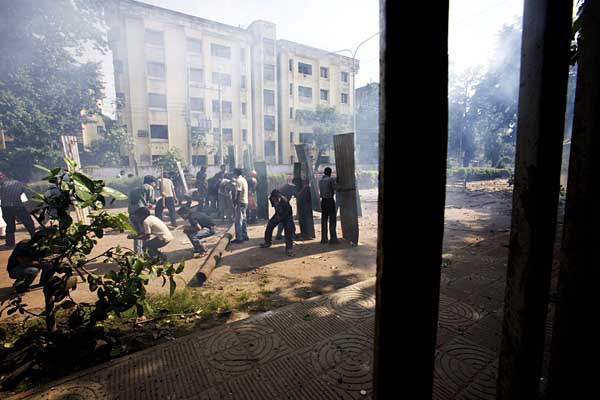
Students at Dhaka University shielding themselves with sheets of tin, during fights with police. Photographer anonymous.
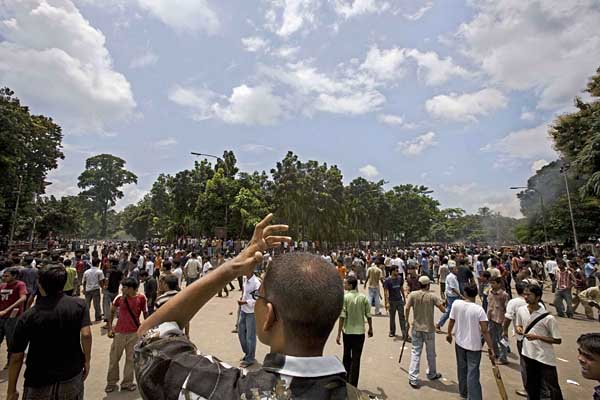
Protesting students gather at Dhaka University campus during violent clashes with police. Photographer anonymous.
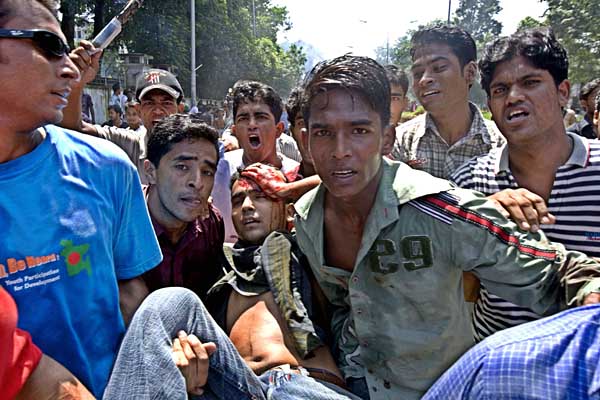
Student hit by police shotgun bullet being carried away by fellow students. Photographer anonymous.
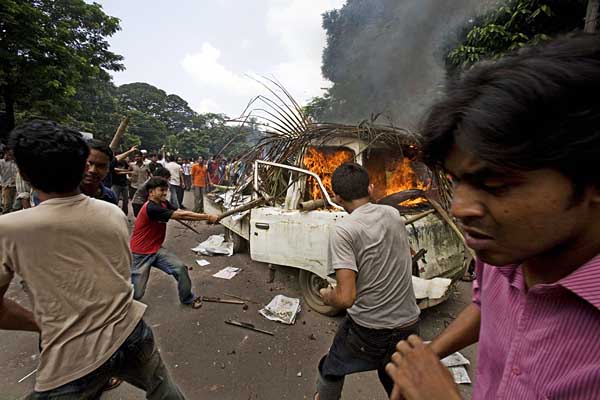
Enraged students burn a car at the Teacher’s Student’s Centre (TSC). Photographer anonymous.
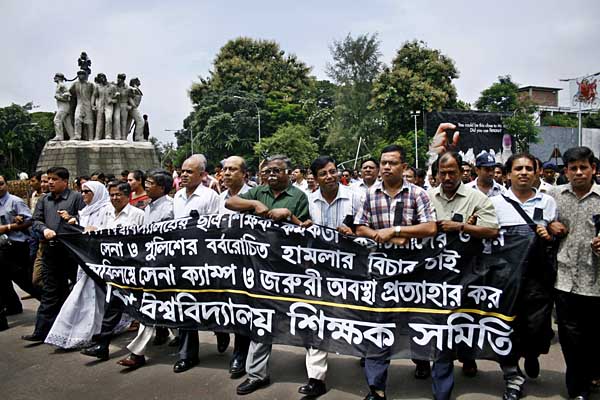
Members of Dhaka University Teacher’s Association protesting against the attacks on campus by police and army, and demanding withdrawal of the state of emergency. Two of the teachers in the front row have since been arrested. 22 August 2007. Dhaka Bangladesh ? Munir uz Zaman/DrikNews
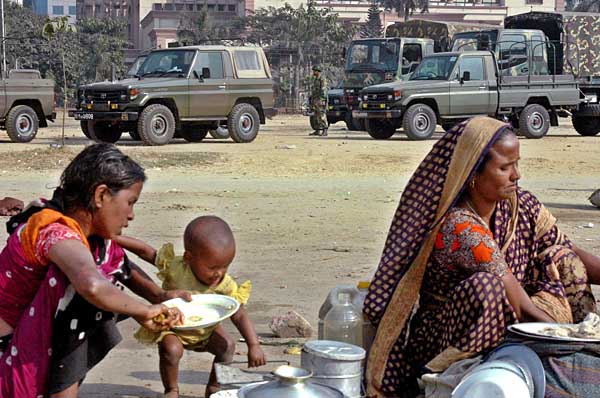
Rocketing prices of essentials create extreme distress for people with low earnings, like the people pictured in the foreground. The military of Bangladesh, which has not had to fight since the birth of the nation in 1971, has in the meanwhile, had increasing budgetary allocations in each successive regime. Numerous allegations about corruption in military purchase, has gone uninvestigated. 22 August 2007. Dhaka Bangladesh ? Munir uz Zaman/DrikNews
The government had taken all mobile networks off the air. With only official press releases for information, the person in the street was in for a rough time. It was easy to find Joshim in the empty car park. Only the occasional long distance truck plied VIP road. I put the video camera on record mode, but relied on my less conspicuous LUMIX to photograph the empty streets. Though I stopped on the Mohakhali flyover to take pictures, I was nervous when the RAB vehicles passed below. There was never a good time for being arrested, but this was as wrong a time as it could get.
Aaasteeey! The policeman strode over lazily. Ki bapar? I did have my card dangling from my neck, and from previous experience, used my confident, ‘I belong here’ approach. That usually worked best with low tier security people.
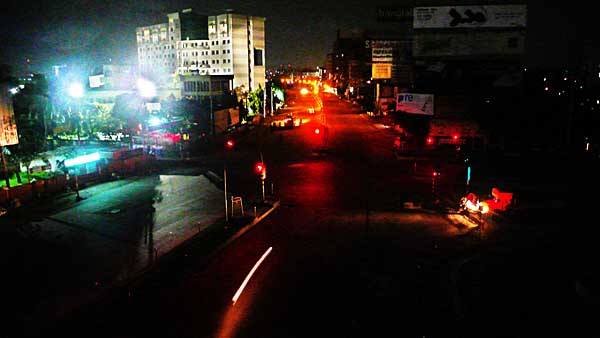
The Mohakhali Junction, one of Dhaka’s busiest traffic spots, is empty on the night of the 22nd August, when the government called an indefinite curfew. Dhaka Bangladesh. ? Shahidul Alam/Drik/MajorityWorld
I’d stopped to take pictures by the near-empty Tejgaon rail station. Stepping carefully through the people sleeping on the floor, I came up to Shahjahan and Neela. Unaware of the curfew, they had brought their sick child Shamim from Tangail, but got stranded in Tejgaon. There was no food, no doctor, no place to sleep, no way of knowing how long this would go on. Each visit to the toilet cost 5 Taka.
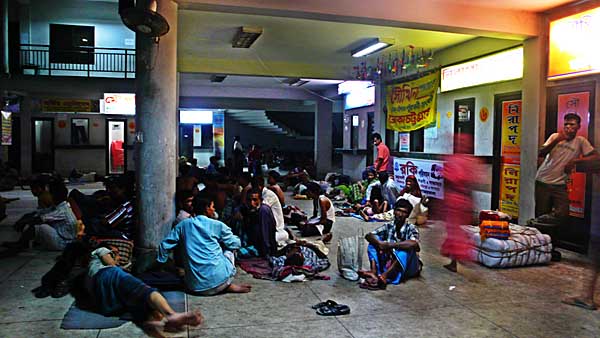
Stranded passengers at Tejgaon Railway Station, sleep on the floor. 22 August 2007. Dhaka Bangladesh. ? Shahidul Alam/Drik/MajorityWorld
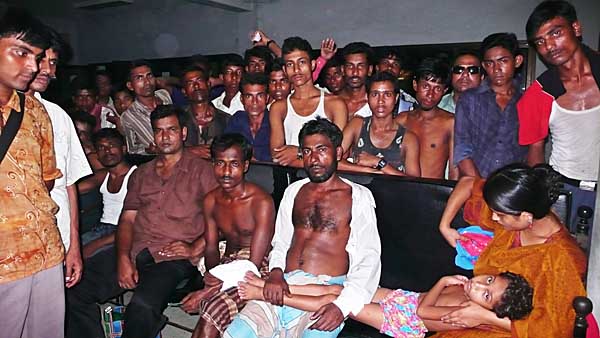
Shahjahan and Neela tend to their sick child Shamim, whom they had brought to Dhaka for treatment. Along with other stranded passengers at Tejgaon Railway Station, the family had no food or drink, or a place to sleep. 22 August 2007. Dhaka Bangladesh. ? Shahidul Alam/Drik/MajorityWorld
The next checkpost was slightly more hostile, but the expired accreditation card dangling from my neck was working overtime. We passed without much harassment. Dropping Joshim home, I went past the Shonar Bangla Market in Karwan Bazaar. The busy market place had a haunted look. No cackle of chickens, haggling for prices, or calls from vendors. Just one man counting loose change.
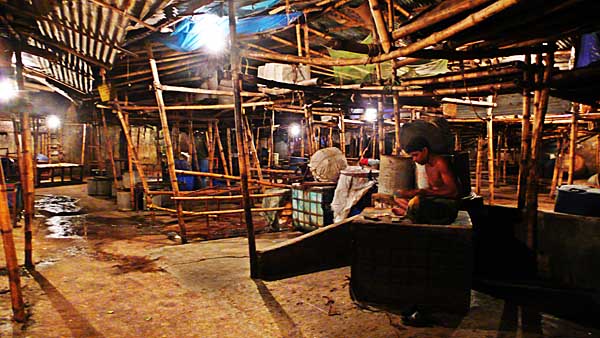
Shonar Bangla Market at Karwan Bazaar is one of the busiest market places in Dhaka. The shops are empty on the night of 22nd August 2007. Dhaka Bangladesh. ? Shahidul Alam/Drik/MajorityWorld
The brightly lit Square Hospital in Panthapath stood out in the dark. Government orders to turn down the lights after dusk to save electricity was presumably for commoners only. The street was empty, but this time as I approached with my camera police converged from all directions. I fumbled a bit, but recovered in time to get one shot. This was not the time to look for best angles. Rattling off important sounding words like ministry of information, and dropping the occasional names I could think of, I got into the car and drove off before the uniformed men had gathered their wits. A government adviser’s business interests in Square Pharmaceuticals – while undeclared – was well known. Students had already attacked the building the previous day. The approaching police knew whose business interests to protect.
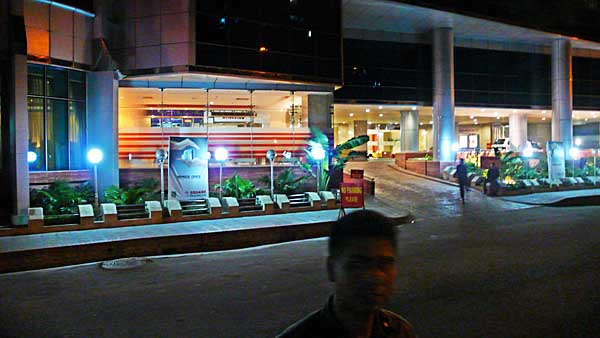
The Square Group, one of the wealthiest business enterprises in Bangladesh owns the Square Hospital. Government regulations prohibit the excess use of electricity and non-essential shops are required to close by 8 pm. Several people were killed by the police when they came out in protest, demanding adequate electricity. The Square Group is owned by the family of one of the advisers of the caretaker government. 22 August 2007. Dhaka Bangladesh. ? Shahidul Alam/Drik/MajorityWorld
The road through Dhanmondi was eerie. The women who walked the streets near Abahani playground were nowhere to be seen. Like the many others who struggled to make a living, they too would not be earning tonight.
The junction near ULAB was scarred by burnt tyres. The convoy of police vans deterred me from getting my camera out and I turned into road 4A. It was time to go home. Kamaler Ma, Joigun, Zohra and Rahnuma were all up waiting. With the mobile network off, they didn’t have any news about me. There must have been others in many more homes who were up worrying.
Rahnuma and I talked of the events over the last two days, of the army camp in Dhaka University. Of a soldier slapping a student. Of the vice chancellor (acting) being beaten up by police. This had never happened before, not even during the Ayub or Ershad military regimes. The reference to ‘evil doers’ in the chief adviser’s speech to the nation was worryingly close to the ‘axis of evil’. Independent media channels were then still defiant. That night the information adviser advised the media to practice ‘self censorship’.
Despite their claims, this government had never been called in by the people. We had no say in who the advisers would be. It was not military rule the people had welcomed, but the cessation of violence and the fear of further anarchy if the rigged elections were held. Banana trees would have made equally good replacements. However, banana trees would not have sold national interests. Closed down environmentally-friendly jute mills. Made slum dwellers homeless, or tortured and killed adibashis protesting the military acquisition of their ancestral lands. So while there was initial relief, as the price of essentials soared, news of nepotism and the partisan manner in which Jamaat -e-Islami was being shielded soon made people realise this banana tree would never bear fruit, let alone run a government.
Warrantless arrests by plainsclothes army under the cover of curfew. Dissenting teachers picked up in the middle of the night. Making threats to independent channels ETV and CSB are hardly the character of a saviour government pledged to the return of democracy. As the behind-the-scene military decides it will now take centre stage. As Bangladeshis realise that a democratically elected autocratic government has simply been replaced by an unelected autocratic one, the tune in the streets is changing.
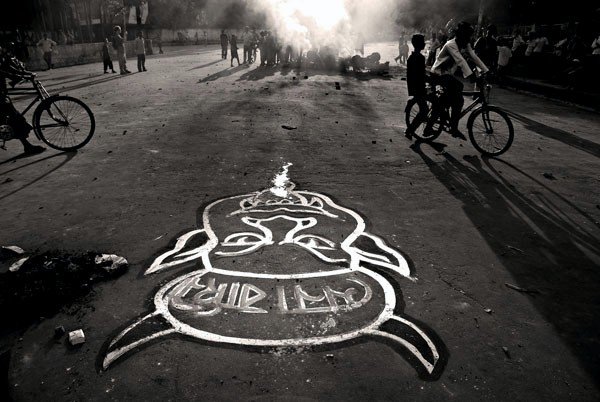
Symbols of fascist oppression drawn on university road. 21st August 2007. Dhaka Bangladesh ? Munem Wasif/DrikNews
Multiple demands of students and teachers have been whittled down to one – withdraw emergency rule. Underground pamphlets are spreading like wildfire. With the Internet down, text messages are filling up the ether. The information adviser’s suave statements to the media faltered as he snapped, “why such a fuss about a slap or two?”
****
The photograph that was being shown here has been removed on the request of the photographer
****
“In unprecedented scenes, soldiers in uniform were seen being chased out of the Dhaka university campus by students. In two days, the myth of the army’s omnipotence was all but laid to rest.” BBC. Photographer Anonymous.
The US has declared support for the chief adviser’s statement. What he lacks is the support of the people.
The Price of Peace
![]()
I am the rage I am the storm
My path I leave barren and shorn
Swaying in my crazy dance
I rejoice at all I face
Move at my own pace
I grapple my foe
I wrestle to die
I am the warrior, head held high*
He was a dreamer, a rebel, a lover, a poet. He moved strong men to tears and woke a nation to unite against tyranny. The British imprisoned him only to find his pen spewing venom from the prison cell. Yet, Kazi Nazrul Islam was a romantic, and his lilting songs, magical stories and even his fiery verse did more to bring together Muslims and Hindus than any peacemaker had ever done. The poor turned away from God?s door, the lover spurned, the weak, the meek, the downtrodden, all found refuge in his words and his music. Unlike the literary giant of the time – Tagore, Nazrul was uncompromising. He spoke of strife, and the peace of acquiescence was never his mettle. Mixing Persian, English and Hindi with his majestic repertoire in his native language Bangla, Nazrul called a nation to war against its occupiers, but also spoke out against the tyranny of religion and class. It was his haunting love songs however, that made Nazrul inimitable. Living the life he preached, he refused to conform. Marrying outside religion, shunning material comfort, and eventually rejecting our carefully defined sanity, he rebelled against a peace that required the acceptance of the status quo. Conflict was his muse.
Lalon, long before him, had traversed a very different terrain. The journey between the body and the soul. The metaphors of the bird and the cage, with the soul flirting with the body, elusive. tantalizing and ever so ephemeral. The sufi saint dealt with the conflict between the material world and the spiritual realm. But for Bangladeshis it wasn?t Tagore or Lalon or even Nazrul, but the struggle for language itself that galvanized the nation. Separated from India on the basis of religion when the British were forced to leave, East Pakistanis had always felt exploited by the West wing and discontent had been brewing, but it was when Jinnah declared that Urdu would be the national language of Pakistan that people took to the streets. The violent birth of Bangladesh, gave a nation with its own language, but Bangali nationalism too became the oppressor of other cultures and the indigenous people of the Hill Tracts have been brutally reminded ever since that they are the other. Their peace could only be earned at the cost of their identity.
Surendra Lal Dewan, was sad that his song had been stolen by the president, but that was not what pained him most. As director of the Tribal Centre in Rangamati, he was required to bring out Pahari women dressed in ethnic garb at regular intervals. They would dance in bright tribal costumes for tourists, visiting dignitaries and even curious Bangalis whenever the state needed to demonstrate Bangladesh?s tolerance and its ethnic diversity. In his song Dewan had spoken of a Bangladesh free of oppression and torture. That a military general, claiming the song to be his own, would use the same words to chant of an egalitarian Bangladesh pierced Surendra with his own words.
Even the naked halogen lamp that shone on the creaky planks that made up the stage near Ispahani Gate 1 had gone. It was the port town of Chittagong and there was no electricity. It didn?t affect Mustafa Kamal and the UTSA theatre group. A string of candles lit up the actors. The children came up close. Kamal wasn?t involved in national issues. He and his group performed to children and their parents, in the slums around Gate 1, and in many other parts of the country. The plays would talk of HIV/AIDS, dowry and land rights. The team would go out to villages and settle land disputes, or fights over someone?s loss of face, by getting the villagers to enact their strife in public. Their participatory plays used humour, love and the occasional risqu? dialogue to enthrall a rapt audience who found a momentary outlet from their tortured lives. But the plays were not simply about temporary relief. They introduced strategies for dealing with the tensions that built up between the landed and the landless, between the buyer and the seller, but also between friends, relatives and neighours. Kamal understood that conflict was a natural product of relationships. While controversies and grievances resulting from differences in values, competition for resources, or perceived threats, often result in conflict, its mitigation rarely depends entirely upon the solution of the problem, but might only require a release through rituals of protest.
Artificial barriers between nations, illegal occupation of lands, the struggle between the worker and the employer, the exploitation of women and children, and the suppression of minorities generate sparks that might set ablaze communities, and the fires needed to be doused. But there was more to art than being the key to the cage. Kamal worried that while his art might allay the tension, it might, through appeasement – like the empty rhetoric of politicians, like the opium fed to the hungry child, like the comfort assured in afterlife, like the promises of peace by generals – help perpetuate the greater wrong.
Shahidul Alam
Los Angeles
24th May 2007
* Translated and adapted from the poem ?The Rebel? by Kazi Nazrul Islam
Abridged from an essay written for the Prince Claus Fund for the 2007 Award Book on the theme ?Culture and Conflict?.
Kazi Nazrul Islam (b. May 25, 1899 ? d. August 29, 1976 ) was a Bengali poet, musician, revolutionary and philosopher who is best known for pioneering works of Bengali poetry. He is popularly known as the Bidrohi Kobi ? Rebel Poet ? as many of his works showcase an intense rebellion against oppression of humans through slavery, hatred and tradition. He is officially recognised as the national poet of Bangladesh and commemorated in India.
The birth date of Kazi Nazrul Islam, originally recorded on the basis of the Bangla calendar, is considered by some to be the 24th May 1899.
Searching for solutions
![]()
It was 1985, when Jun Jun and I came over for our first trip to Nepal. I had nearly died of hypothermia in our trip to the Everest Base Camp, and Jun and a Japanese explorer had saved my life. My subsequent trips to Nepal have been marked by other drama. As I left for the airport yesterday, Navaraj, the tutor at Pathshala from Kathmandu reminded me that I was going to a new Nepal, one no longer under the rule of the king. Sapna, the human rights lawyer we interviewed in Kathmandu today, remarked wryly, that it was a Nepal ruled by many kings. With the Moaists now in government, one hopes that at the least the violence will go down. Too many lives have been lost.
The killings and disappearances in Nandigram in the largest democracy in the world, and the recent killing of the Adivashi Garo activist Choles Ritchil in the most brutal manner imaginable – ?Choles?s two eyes plucked, testicles removed, anus mutilated, two hand palms smashed , nails of 3 fingers of the right hand removed, left hand thump finger nail removed, two palms had holes, upper right hand had severe wound, several blood stains on the back part of the body, in both thighs middle part there had been two holes, back part of the body had several black marks, several deep marks of wounds on both lower legs, there had been black marks on feet, no nail on thump of right foot, all fingers of two hands were broken.? – by the much lauded new regime in Bangladesh are worrying signs. With conventional media under threat, bloggers become the lonely and marked whistle blowers.
Majority world photographer and All Roads winner from Guatemala Sandra Sebastian is one of many activists in search for solutions.

I couldn?t believe that passers-by weren?t killed when a shooting occurred between drug traffickers on a busy day in one of the principal avenues in Guatemala City. Two presumed drug traffickers were murdered in their car, which had lots of AK-47 bullet-holes. There were hundreds of bullet-holes all around the avenue. The walls of a school and a bus stop where many people usually sat, were also riddled. Unfortunately two men died, but it could have been a massacre. How many people have to be killed before something is done?
I wasn?t the only astonished person. I took the picture because I want to document and leave a testimony of the time I live in and show the danger that ordinary people face. In the last year alone (2005) more than 5,000 people were killed in street violence in a country of 13 million people. The reasons? Delinquency, organized crime, drug trafficking, poverty, broken homes. I want to talk of the inefficient justice system and the impunity with which some operate. I want to point to the consequences, and hope people can understand and search for solutions.
I can kill any Muslim
![]()
Year end play: The Nuculier God
Theatre: The World
Set Design: Tony Blair
God: George Bush
Sacrificial Lamb: Saddam Hussein
Slaves: Saudi Royal Family and cohorts
Extras: The United Nations
Theme song: I can kill any Muslim
I can kill any Muslim
Any day I choose
It?s all for the cause of freedom
I can kill any Muslim
Wherever I choose
It is cause we?re a peace lovin? nation
So we egged him on
When he attacked Kuwait
And the trial may have been harried
So we supplied him arms
To gas the Kurds
With him dead, that?s one story buried
Violence in Iraq
Has been on the rise
The US can hardly be blamed
Our interest was oil
And we stuck to our goal
Why must my cronies be named
Saddam?s emergence
As Arab resistance
That wasn?t part of the plan
Had Amnesty and others
Kept quiet when it matters
We?d have quietly gone on to Iran
Asleep I was
When he hanged on the gallows
Well even presidents need to sleep
Oblivious I was
When the planes hit the towers
I had other ?pointments to keep
More Iraqis dead
More ?mericans too
OK they warned it would happen
Why should I listen
When I rule the world
No nation?s too big to flatten
The Saudi Kings
They know their place
At least they?ll know by now
Muslim?s OK
If you tow the line
Out of step, off you go, and how
Tony and me
We keep good company
Dictators know when it matters
Regardless of crimes
And religious inclines
Safe if you listen or its shutters
I can kill any Muslim
Wherever I choose
I choose quite often I know
I can kill any Muslim
Any day I choose
I did it so now they will know
Similar to Rumsfeld’s concern that the Abu Ghraib pictures coming out, and not about the events themselves, the Iraqi government worries about the footage of Saddam being taunted, getting out. The fact that the taunting took place doesn’t appear to be an area of concern. With the US government stifling Al Jazeera, and increasing censorship in mainstream media, citizen journalism appears to be the only way people can get past the PR camouflague.
With all political parties of Bangladesh, as well as most Muslim leaders around the world, choosing to remain silent at the execution of Saddam Hussein, it is left to human rights organizations to remind us, that despite his atrocities, Saddam will be remembered for his defiance. The butcher of the Kurds will go down in history as a victim of flawed justice. The guns are now clearly turned against Iran, but the Saudi rulers, as well as the Egyptians and the Jordanians would do well to ponder, ?Who is next??
Profits versus the Poor
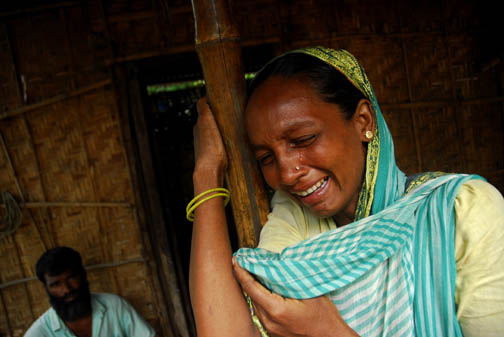 ?I have lost a son, maybe I?ll lose another, but I won?t let them setup a coalmine here.? To Tahmina Begum who had lost her son Toriqul to police bullets, her land was also her family.
?I have lost a son, maybe I?ll lose another, but I won?t let them setup a coalmine here.? To Tahmina Begum who had lost her son Toriqul to police bullets, her land was also her family. 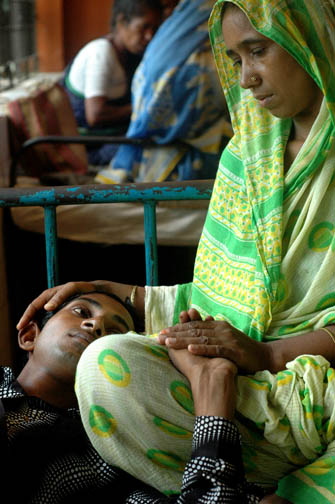 It could have been a ?B? rated western except that it is set in the east.
It could have been a ?B? rated western except that it is set in the east. 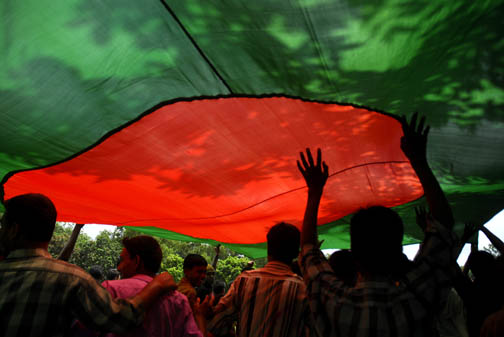 People wanting to hang on to their ancestral land versus mining companies wanting huge profits. There have been only minor changes from previous scripts. When farmers wanted fertilizers and seeds, the police had opened fire killing them, when they wanted electricity to irrigate their soil, the police had opened
People wanting to hang on to their ancestral land versus mining companies wanting huge profits. There have been only minor changes from previous scripts. When farmers wanted fertilizers and seeds, the police had opened fire killing them, when they wanted electricity to irrigate their soil, the police had opened 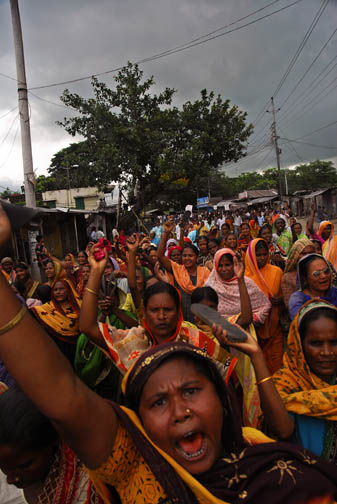 fire killing them. Now that they want to retain their land rather than have it converted into coal mines again the police have opened fire killing them.
fire killing them. Now that they want to retain their land rather than have it converted into coal mines again the police have opened fire killing them. 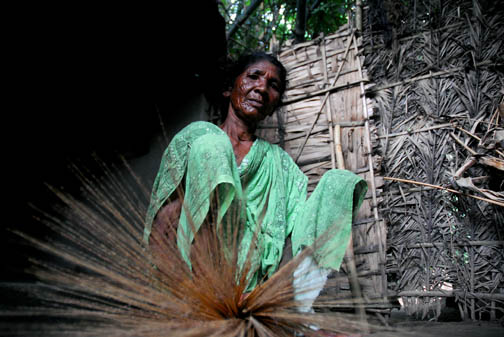 The Shaotals, being indigenous minority groups, find themselves even more vulnerable within this persecuted community. In the shootings on the 26th September 2006, in Phulbari, Dinajpur, in northwestern Bangladesh, at least six villagers are known to have been killed, over a hundred are said to be missing.
The Shaotals, being indigenous minority groups, find themselves even more vulnerable within this persecuted community. In the shootings on the 26th September 2006, in Phulbari, Dinajpur, in northwestern Bangladesh, at least six villagers are known to have been killed, over a hundred are said to be missing.
Sitting on a man’s back
![]()
Three bombs had gone off the day before, and they weren’t comfortable about me walking on my own in the streets of Kabul.
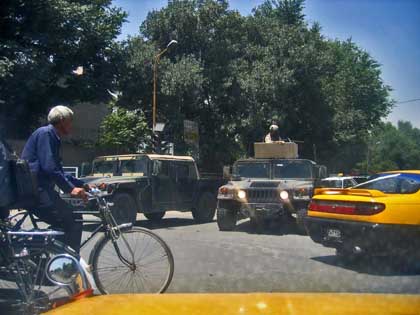
The driver insisted that he gave me a lift. The suggestion that a particular hill not too far away would give me a good view of the city was a good one, and the late evening light was just leaking through the haze. He offered to stay to give me a lift back, but I wanted to be on my own, and writing down that I needed to get back to Choroi Malek Asghar, I wandered off, free at last. Coming down the hill, I wandered through the back streets as I tend to do in cities I am new to. An odd conversation in my broken Urdu helped. As always kids wanted to be photographed, and wherever I went, people offered me cups of tea, or invited me home.
Abdul Karim latched on to me. Insisting that I visit his family, he took me through the narrow winding mud path that led to the tiny doorway that was the entrance to his home. My first task was to take photographs of the family. I had none of the language skills he had, but it didn’t seem to matter. Initially surprised by this stranger the man had brought home, the family quickly turned to more important things, like being hospitable to this mehman (guest).
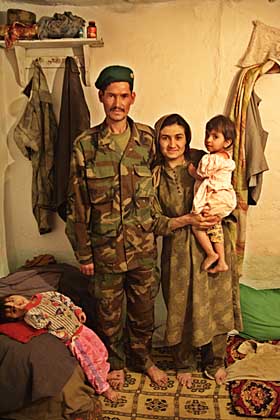
I gesticulated wildly enough to convince them that I needed to catch the light while it was there, and Abdul Karim became my self appointed guide. I could go and take some photographs, but was to come back and have tea. The sun had almost set by the time we were back up the hill. A lone runner ran circles around the flattened top of the hillock. Football fever had set in and the shouting of the kids chasing a ball in the dried up swimming pool in the centre, carried through the evening sky. Four young men came up and made conversation. Two of them had been to Pakistan, and we spoke in Urdu and in English. One was an out of work webmaster, and wanted my email address. They posed, I photographed, and he scribbled his email address so I could email the picture back.
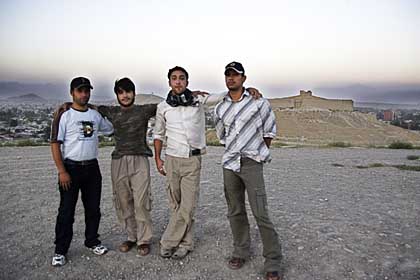
The sun had set and Abdul Karim wanted me to keep my end of the bargain. The young men also wanted me to visit their homes. Perhaps they could take me out the following day they suggested. They knew great places for photography. We exchanged mobile phone numbers. Undiplomatically, I suggested that perhaps they too could come to Abdul Karim?s and then I could go with them to their homes. One young man took me aside and explained that they couldn’t go. It would be breaking purdah. I wondered how I had become an exception to the rule.
Abdul Karim, his mother, Bibi Shirin, his wife Ayesha, and their two children Mehjebeen and Sufia lived in this one room flat. There were mattresses on the floor and one television set and one radio. There was a tiny courtyard and metal steps that went up to what looked like a loft. Abdul Karim had worked as an engineer in the marines and was now out of a job. He showed me the children’s book he used, to try and teach himself English. Even with body language and the best of intentions, our communication faltered, but there was no mistaking that I was a welcome guest, and my major challenge that evening was leaving without having dinner with the family. The path outside was by now pitch black, and Abdul Karim walked me through the maze and got me to a cab. We parted with some sadness.
Back at the Aina office where I was staying, the guard with the Kalashnikov welcomed me with a smile. I could see why my colleague Nazrul hadn’t left the compound for the last two months.
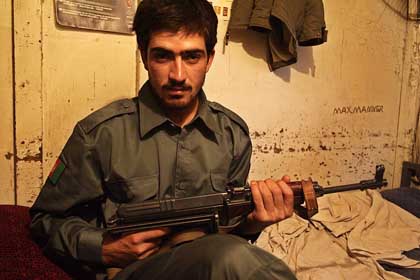
Day before yesterday we drove up to Salang, past the bombed out ruins of what had been thriving villages, past the tank carcasses, past vast stretches of barren land, interspersed with lush foliage by the river beds. A young man took great pleasure in racing his steed against our minivan. Two boys flagged me down, insisting that their friendship be recorded in my camera.
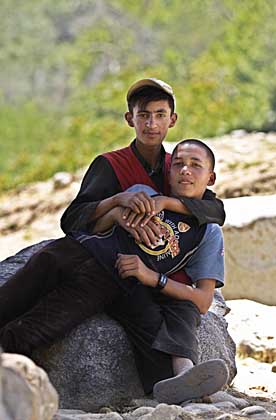
Back in Kabul, I did walk out on my own, without an escort, and went to the marketplace. The men in the bakery insisted that I try their freshly baked bread and I briefly sat with new found friends and watched Hindi films in the restaurants.
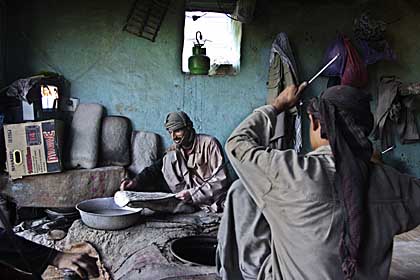
I spoke to Arif who ran a small studio, and came across the out of work labourers in the market square looking for work. A child and an old man reached into the gutter to pick up a polythene bag they could sell. It was in a worker’s face that I realized why people who are capable of so much hospitality, and are so willing to give, have become objects of terror to the foreigners who live here.
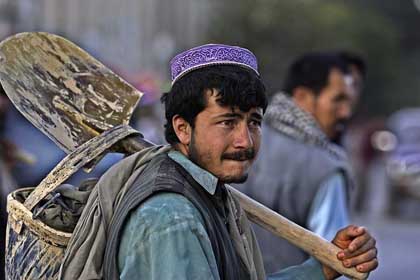
They want the very things that the west has officially championed. Jobs, security, a home for their families and for their land to be free of occupation.
Organisers at the Sarina Hotel claimed it was the first fashion show in 20 years in Afghanistan. There were few tell tale signs of the riots that had taken place here a few days ago. But the white Land Rovers outside, four sets of security barriers, and the armed US soldiers on guard, marked the distance between central Kabul and the rest of the country.
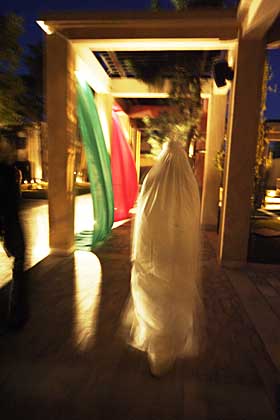
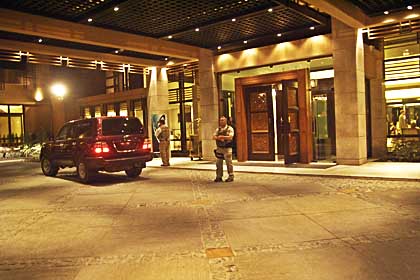
I remember Tolstoy’s words “I sit on a man’s back, choking him, and making him carry me, and yet assure myself and others that I am very sorry for him and wish to ease his lot by any means possible, except getting off his back.” They seem to have learned little in 120 years.
Choroi Malek Asghar
Kabul
9th July 2006
Identity Card
Subscribe to ShahidulNews
The mail today brought a copy of ?Amader Kotha?. A publication by the American Center in Dhaka. The lead article in this unsolicited newsletter by Abu Naser was entitled ?An International Election in November: A chance for Bangladesh to learn about democracy?. As I landed at Zia International Airport yesterday, my colleague Tanvir, told me of the gunning down of the opposition MP the day before. At night I stopped the rickshaw to photograph the burning cars in the streets. The violence, the protests, the despair, is all too familiar. We saw it during military rule and during all the subsequent regimes. Abu Naser rightly, points to failures in the democratic process in Bangladesh. But to learn about the democratic process from the US! Perhaps it had to do with Rumsfeld?s claim that their failed cover up of military atrocities was evidence of a healthy democracy. Their previous ?exemplary? election is perhaps better left unmentioned.
I remember the surprise in the media in the UK, aghast at what was being reported from Iraq. It is hardly as if this had not been known before, by anyone who might have cared to listen. I am less surprised, when the confirmed atrocities by US soldiers, is suddenly seen as something done by them out there. No talk of coalition forces this time. No talk of united responsibilities, or united blame. I am not surprised when the assassinations in Palestine resulted in merely the predictable ?condemnation? by the UN and western nations. ?Tut tut, you mustn?t do that you know!?
I see the fire raging around me and throughout the globe and remember Mahmoud Darwish?s anger.
Shahidul Alam
Dhaka. May 10th 2004
Identity Card
Write down!
I am an Arab
And my identity card number is fifty thousand
I have eight children
And the ninth will come after a summer
Will you be angry?
Write down!
I am an Arab
Employed with fellow workers at a quarry
I have eight children
I get them bread
Garments and books
from the rocks..
I do not supplicate charity at your doors
Nor do I belittle myself at the footsteps of your chamber
So will you be angry?
Write down!
I am an Arab
I have a name without a title
Patient in a country
Where people are enraged
My roots
Were entrenched before the birth of time
And before the opening of the eras
Before the pines, and the olive trees
And before the grass grew
My father.. descends from the family of the plow
Not from a privileged class
And my grandfather..was a farmer
Neither well-bred, nor well-born!
Teaches me the pride of the sun
Before teaching me how to read
And my house is like a watchman’s hut
Made of branches and cane
Are you satisfied with my status?
I have a name without a title!
Write down!
I am an Arab
You have stolen the orchards of my ancestors
And the land which I cultivated
Along with my children
And you left nothing for us
Except for these rocks..
So will the State take them
As it has been said?!
Therefore!
Write down on the top of the first page:
I do not hate poeple
Nor do I encroach
But if I become hungry
The usurper’s flesh will be my food
Beware..
Beware..
Of my hunger
And my anger!
An extract from the text of the Berlin Festival Appeal:
“Mahmoud Darwish was one of the best-loved Arab poets of modern times and counts among the most eminent poets in the history of world literature. Thousands flocked to hear his readings, and his volumes of poetry have been published in the hundreds and thousands. Numerous pieces have been translated into more than 30 different languages. His poems have been transformed into folksongs and many of his verses have taken on the character of proverbs.
Darwish‘s poetry draws inspiration from the tradition of ancient Arab poetry and Modernist influences and borrows from the style and language of both the Qur’an and the Bible. Few other poets have displayed such dedication to articulating a vision of a meaningful, real and fair peace between Arabs and Israelis, which furthers a dialogue between two voices and two different outlooks on life, while ensuring that one does not impose its view upon the other.
In the tradition of ancient Arab poetry, the poet assumes the role of spokesperson for his people. And despite Darwish‘s move away from this role since the 1990s, many readers still viewed him as Palestine’s literary ambassador to the last.
Mahmoud Darwish was born in 1941 in the village of Al-Birweh near Acre. In 1948, he fled to Lebanon and returned after the foundation of the state of Israel. He worked as an editor for various political and cultural journals in Haifa. After being imprisoned on numerous occasions, he left Israel in 1970 and went into exile. He has lived in Moscow, Cairo, Beirut, Paris and, most recently, in Amman and Ramallah. In 1987, he was elected to the executive committee of the Palestine Liberation Organization and helped draft the Palestinian Declaration of Independence in 1988. He left the organization in 1993 in protest against the signing of the Oslo Accords. He received numerous awards, including the Lannan Prize for Cultural Freedom in 2001 and the Erich Maria Remarque Peace Prize in 2003.
Darwish died on 9 August 2008 following heart surgery. He was buried in the West Bank city of Ramallah and granted a state funeral.”
—
Gallerie Publishers
208 Om Chambers
Kemps Corner
Mumbai 400036
India
————————————————————————————
Mahmoud Darwish 1942 – 2008
When a Pineapple Rolls
Subscribe to ShahidulNews
![]()
Getting hold of a copy of the banned magazine was difficult, but most of the people who were subscribers seemed to have read the article. As often before, censorship had given the Time Magazine piece a notoriety, and readership appeal, it might not otherwise have had. The ban was short lived, and soon the article had been forgotten.
The Bangladesh government’s treatment of its journalists however had not been so short lived. The Channel 4 journalists were predictably, released well before Christmas. For Saleem Samad, and Priscilla Raj, the situation was considerably different. Tortured and terrorised, they fell victim to a government in permanent fear of being labelled `fundamentalist’. When a pineapple rolls it is the grass that suffers, and post 9/11, it is the small states that have felt the pangs of `terrrorism control’.
The ban of the 28th July 2003 Newsweek issue was based on fears at home. “Repeated bans on international magazines on account of articles on Islam constitute a flagrant violation of the free flow of information,” Reporters Without Borders said in a letter to Bangladeshi information minister Tariqul Islam.
The RSF statement fails to address the wider issue of control on the media. Arranging photo ops, planting questions at press conferences, removing access to the `pool’ for dissenters, spin, corporate control of the media and the newly found ally of embedded journalists are beyond the reach of a government with limited media management skills. Fisk, Chomsky, Pilger, Monbiot et.al. have made valiant attempts to overcome media control in the west. But neither their work, nor the excellent independent analyses that have circulated on the Net, have managed to create a significant challenge to a well-entrenched propaganda machinery. They have largely preached to the converted.
The handling of the Channel 4 incident and the ban on Newsweek by the Bangladesh government were at best clumsy. Buying out the limited copies that are imported for Dhaka’s elite, could have far better stymied the tiny readership to Time and Newsweek in Bangladesh. An “Out of Stock” label has far less glamour than a “Censored” sticker. The harassment of Samad and Raj, was unnecessary. These were ill paid professionals trying to make a living helping foreign journalists.
A flimsy majority that depends upon a small but significant Islamic party, makes things further complicated for the government of Bangladesh. Dissent within has to be managed along with keeping in the good books of powerful states. The earlier Time Magazine article on Al Qaeda links, was tenuous at best, and the Far Eastern Economic Review article on the rise of fundamentalism was shoddy journalism. But when it is so important to say one has been a good boy, any slander, no matter how unbelievable, has to be vehemently denied. Banning the award winning film Matir Moina, (now showing in cinema halls, with only minor amendments) was a knee jerk reaction, symptomatic of a nervous government trying to juggle with appeasement outside and appeasement within.
This is not the first time the Islamic parties (Islami Oikya Jote, IOJ) have played a key role in parliamentary dynamics. Popularity for major parties far exceeds the following of OIJ, a small and disciplined party. Despite their low votes however, they have had a key presence in all governments since the elections in 1991. “We could withdraw from the alliance if the demands are not met,” Mufti Fazlul Huq Amini has threatened at strategic moments, and the government does not want to rock its own boat.
While we may be thankful that the Bangladesh government is not media savvy, the more crude attempts to suppress free journalism doesn’t bode well for media professionals. We have now had three largely free and fair elections, but the elected representatives of the people have hardly behaved in a democratic manner. Each of the three governments have resorted to violent means to ensure loyalty. More recently, warrants of arrests, issued against five editors and one executive editor on defamation charges, within a period of three weeks, represents a shift in strategy. The minister’s statement “Wherever you will find journalists, break their bones,” was really intended for rookies on the streets, and rural journalists. Going for the big boys is a more recent affair.
So how does a nation, scared of big brother, and managing a rickety coalition handle the media? Letting the journalists speak appears to be the most sensible route out. Surely, not all western journalists will be as incompetent as their Times and FEER counterparts. Maybe they themselves, given a more free hand from corporate control, would exercise the journalistic rigour required of them. Strengthening local media would go a long way in providing alternative analysis to western viewpoints. Murdered journalists don’t write too well.
“Not a hair will be touched” the minister had said in 1994, when feminist writer Taslima Nasreen was facing persecution. Not a hair was touched, and Nasreen, still under threat, was provided safe exit to a land of her choosing. In the same July 1994 issue where the NYT covered this story, there was another news, of a US doctor going to work in a bullet-proof vest and being shot in the head. While one tripped over the word fundamentalism in the Nasreen article, religion or fanaticism was never mentioned in the story of the doctor’s death. When journalists regurgitate a state’s values, control is complete. Thankfully, Bangladesh has not reached such levels of state control, and our journalists have not reached such levels of acquiescence.
A responsible media which operates freely, could do wonders for Bangladesh, for its image and its people. But there is a downside to this. A more informed public would be less easily manipulated, corruption would be more difficult, absolute power would be more readily questioned. Government acquiescence in the face of western interests flies against the rhetoric of demands for free press by western states. Secret deals are more easily made in the absence of meddling journalists.
As for terrorism, we would love to see it end. If only the US would stop manufacturing it.
Shahidul Alam
Fri Aug 15, 2003
